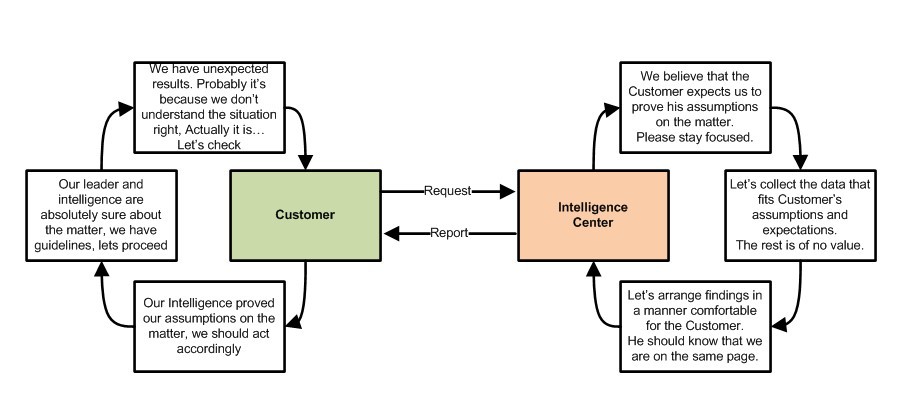5 Most Common Diseases of Private Intelligence
Almost every big company and certainly all private investors hire specialized companies and agencies to validate, collect and analyze intelligence on existing or potential partners, customers, lobbies and suppliers. In the modern world intelligence is a market not just a secret service working for the government.
It’s hard to underestimate the influence of global companies on political decisions.
The same time, comparatively with more transparent markets, intelligence is rather closed and often it’s uneasy to evaluate the provider of appropriate services. Moreover, private intelligence is a developing market and providers overcome their own challenges and changes.
The company that was good years ago may be in its worst condition ever, but the client will not be able to find this out before the provider fails.
In this article we share most common diseases of private intelligence agencies diagnosed in 2019. The text isn’t serious, but we believe that you should check your current contractor and find out that he is not infected.
![]()
1 – Documentum Potest Scribere Stultus (DPSS) [Any Fool Can Write]
Symptoms:
The Patient thinks: “Let’s hire students, they will do all this stupid paperwork for us”.
Word, Excel, couple of public databases and simple Google search skills – that’s the full list of knowledges and competencies of Patient’s best employee.
“Student” sounds weak? – Ok, let’s call him/her Analyst or Specialist in Reporting, this should work!”
Depending on the age and wealth of the patient students can be Harvard graduates or first year students of Never-existed Agricultural university of the Dark side of the Moon.
DPSS can range in seriousness from mild to life-threatening.
Description:
DPSS is a very common disease of big and mid-size companies working in the private intelligence field. New-born businesses rare affected by DPSS, it is the most serious to companies of above 5 years old.
Not specific to intelligence market, can be diagnosed in management consulting, law advisory and financial audit.
DPSS affects top-managers and business owners (most frequently).
Causes of disease:
1. The Patient believes that his business is growing. He thinks he knows everything about the market and the time has come to make more money selling personal and/or corporate brand. In general, the Patient underestimates skills, knowledges and expertise required for providing of professional services.
2. The Patient doesn’t have unique long-term strategy of development for his own business. He copies strategies effective for companies working in other industries (background screening, verification, outsourcing etc.); DPSS can be just a complication of several other serious diseases.
3. The Patient faces challenges of price-competition with already infected companies. This cause is the most common for patients with DPSS living in developing countries of Eastern Europe, India, Brazil. Some well-known companies in the EU are also suffering because of the competition with DPSS infected companies.
Treatment:
No specific treatment is required for DPSS, but therapy is important to help the patient in accepting the truth that he is infected.
1. Patient’s attention must be pointed to the fact that introducing “students” as intelligence experts he devaluates his personal experience in public or private intelligence. Moreover, he discredits his former colleagues and partners.
2. Basic analysis of financial results can show the patient that this strategy is not effective in terms of shareholders value and net profit.
Prognosis:
Positive. Some patients can leave intelligence market (even if it is not declared to the public) and shift to more predictable and transparent businesses like corporate investigations, background screening, KYC services etc.
Recommended long-term monitoring of patient’s business reputation.
![]()
2 – Proluit vendit psychosis [Maniac-seller psychosis]
Description:
Maniac-seller psychosis can be diagnosed in companies with underperforming sales teams. Patients with weakened sales systems, or already facing difficulties paying bills, are at higher risk of developing severe illness from Proluit vendit psychosis.
This disease is common to intelligence companies with roots in big state or private corporation.
Symptoms:
“We have a client and we must help him in solving all his problems. No matter if the client needs in-depth research of Nigerian opposition or his employees in California are stealing toilet paper – he is our client and we need every dollar he is ready to spend on security and intelligence!”
The patient doesn’t really know what he can do, his capabilities can be strong or weak, but he tries to provide almost any possible intelligence or security related service to his client at almost any cost.
Usually the patient is good in manipulations. He can explain his behavior “my company needs money”, “we must do this to ensure that the client will be with us for a long time”, “that’s what others do but they will never confess” etc.
Fighting for every request of the client the Patient loses his time, money, and business reputation. Employees of the patient often disoriented, underpaid, and frustrated.
Causes of the disease:
1. The patient believes that he has built his company following the rule “your client is your most valuable asset”. The same time, deep in his heart the patient disrespects the client considering provider-clients relations as nothing but a source of personal/corporate wealth. The patient hopes that the client will pay invoices no matter if provided services are professional or not.
2. The patient can strongly rely on his communications skills in post-production period and on his personal relations (probably even corrupted relations) with the client.
3. Often misunderstanding of the word “flexibility” is the main driver of Maniac-seller psychosis. In the most neglected cases the patient doesn’t even know what he’d like his company to do.
Treatment:
1. Isolation of the patient from the client.
2. The company should be reorganized preferably on a project/team basis when every service of the company is developing by specialized team attempting to develop, promote and sell specific intelligence or security solution/service.
3. Successful teams can be prevented and united under the new brand.
Prognosis:
• Negative without appropriate treatment.
• The company can be occasionally stabilized for several years, but no hope for long-term development and survival.
![]()
3- Devaluation of human sources
Description:
This disease is common to European and Asian companies working in intelligence field for 3-6 years. Most patients previously (before 2008-2010) worked in marketing and consulting and had no appropriate military or intelligence experience.
This is one of the deadliest diseases threatening all players of the market.
Symptom:
Incoherent speech, delirium, dreams of world domination (awards, certificates, conferences, etc.). Patient can try to convince you that “We can provide human intelligence for a fix price, no matter who is the source and the subject. For example, we can ask Trump’s advisor if the US plans starting a trade war with China for a fixed price of 600 Euro per reference, for the same price we can ask Kim Chen Un if North Korea plans invasion to the South. This price policy shows our clients that we are very professional and resourceful.”
Causes of the disease:
1. Lack of professional experience
2. Extreme focus on sales
3. Resellers psychology (the patient prefers forwarding results instead of trying to collect intelligence himself)
Treatment:
1. Isolate the Patient – do not even try making business together. The disease is very contagious!
2. Stay calm. Treat the Patient like a child. Explain everything. Be kind.
Prognosis:
• Positive, if treated well.
• 90% of patients leave the market and make good money in bordering industries: verification, consulting, marketing etc.
![]()
4 – Krilov’s symptom
Description:
Description:
The symptom is called after Ivan Krilov (1769-1844) Russia’s best-known fabulist who died of gut flap due to overeating. The cause of his death is a popular gossip, which is not true (fake).
Symptoms:
Patient is trying to have his finger in every pie. He takes part in every discussion (preferably political) sharing his thoughts and expertise.
The patient publishes dozens political reports of doubtful quality every month and very active in social networks. Quite often Krilov’s symptom is a subsequent sickness of DPSS [a fool can write Document].
Krilov’s symptom has a lot of variations and uneasy to diagnose.
“We should comment every single political issue, no matter if our analysis is good, bad or based on doubtful sources – who really cares?! Intelligence company must go public!”
“Intelligence officer must be a whistleblower with a strong political position!”
The Patient hates #Russia #Ukraine #Israel #Palestine #Trump #Democrats #HSBC #Communists #Putin #NATO #Santa_Claus no matter.
Treatment:
1. Turn off all means of communication. 2 months offline should be enough
2. Explain that intelligence is not about politics, its about knowledge and ability to be impartial
3. Discharge all Patient’s employees. Highly likely they are not infected.
4. Don’t worry about the money and clients. Usually Patients has never seen neither clients no money. But if the Patient has a client just leave them together, probably the client and the Patient are incurable.
Prognosis:
• The Patient will have to deal with relapses every 4-5 years
• Good retirement plan is a positive mark
![]()

Broken cart: Disease of Intelligence #5
Symptoms:
Instead of doing his job responsibly and professionally, the Patient directs all his strength to guess the expectations and preferences of the Customer. The Patient is trying to guess what the Customer would like to see in the report and always ready to adjust his findings and analysis accordingly.
Description:
Relationships between intelligence professionals and their customers have a lot in common with such between infectious diseases specialist and a very contagious patient. The risk to become customer’s puppet is always rather high. The same time, intelligence is useless if there’s no customer.
There’re two different types of this disease:
– Governmental. It is common in state institutions and MoD contractors. Sometimes the disease is burdened by careerism, fear of failure, and simplified [polarized] models of the real world (like friends & foes opposition, for example).
– Private, which is mostly provoked by the desire of the Patient to make more money and his wish to maintain good relations with the client at any cost.
The disease is deadly dangerous for patients of any age, brand value, corporate culture, size and wealth.
Average companies (too big to be dependent on a very limited number of clients and too small to be state contractors or shareholders’ value hostages) have stronger immunity.
Causes of disease:
Some researches assumed that the disease is unavoidable and should be considered as an integral part of intelligence since decision making process, data collection and data analysis are independent processes. Same professionals believe that unbiased intelligence is a myth.
Another common cause of this disease is the lack of self-confidence and integrity.
Everyone knows that intelligence in most cases works with incomplete or fragmentary information. Build a reliable model of current events (the model which is built always on fragmented data) and subsequently predict future scenarios is a risky game. First, intelligence center can’t be sure that the Customer doesn’t have the information or knowledge which is unavailable to the analyst. Second, ruining myths of the Customer can negatively influence the budget.
Treatment:
The Patent can’t be cured without Customer’s care.
Recommendations to the customer of intelligence:
– Don’t work with the same intelligence company/agency/professional for too long. Allow freshmen in the industry. Old generals and grayheads must teach, write, educate, but don’t let them spend the rest of their lives guessing what you are ready to accept as the truth.
– Ensure that the Patient knows that there’s a second opinion: another agency, company, professional who is working on the same task.
– Don’t expect that intelligence will always prove your assumptions.
Prognosis:
Negative without proper treatment of the Patient and the Customer

